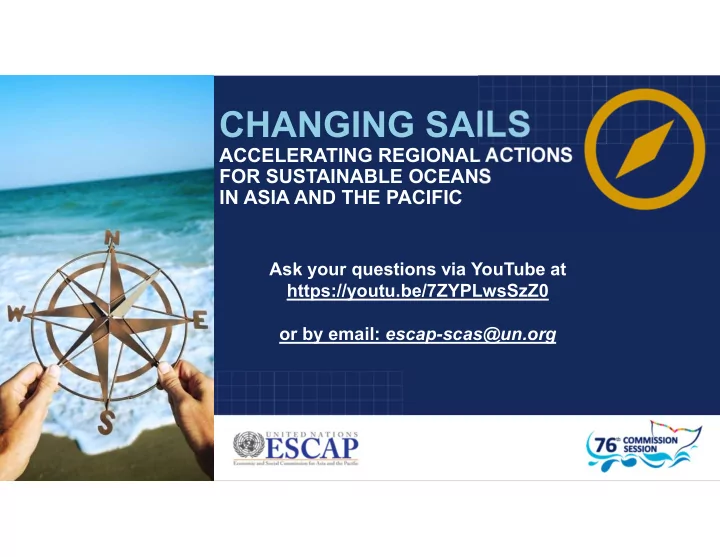

CHANGING SAILS ACCELERATING REGIONAL ACTIONS FOR SUSTAINABLE OCEANS IN ASIA AND THE PACIFIC Ask your questions via YouTube at https://youtu.be/7ZYPLwsSzZ0 or by email: escap-scas@un.org
About ESCAP • ESCAP is the development arm of the United Nations in Asia and the Pacific focusing on the 2030 Agenda for Sustainable Development. • Each year, the region’s governments converge at Commission session to agree on regional responses on shared challenges. • ESCAP stands behind countries with research, thought leadership and technical support. 1
76 th Commission Session Theme Study “Promoting economic, social and environmental cooperation on oceans for sustainable development.” • The theme study Changing Sails: Accelerating Regional Actions for Sustainable Oceans in Asia and the Pacific will inform discussions at CS76. • Through regional cooperation, the theme study identifies four key areas where member States can protect oceans and achieve SDG 14: Life Below Water. 2
Four Key Recommendations for Regional Cooperation on the Oceans Data and Statistics 1 Maritime Shipping 2 Fisheries 3 Marine Pollution 4 3
State of ocean data 1 • Data are available for only 2/10 targets on SDG 14 : Life Below Water • Marine pollution • Conservation of coastal areas • Significant knowledge gaps remain in ocean acidification, fisheries and fishing- related activities, and increasing economic benefits to small island developing States (SIDS) and least developed countries. 4
Challenges and opportunities 1 • Strengthening the use of System of Environmental Economic Accounting and the accompanying Experimental Ecosystem Accounting to support biodiversity policies. • Ocean health is showing decline in both exclusive economic zones and the high seas. A stronger push is needed for investing in oceans data. Ocean Health Index: exclusive economic zones Ocean Health Index: high seas 5
Developing official ocean statistics 1 • National statistical systems need support through joint efforts to get a complete picture of the ocean and monitor progress toward SDG 14: Life Below Water. • Increased country to country assistance can fill data gaps and bridge fragmented data. • Regional collaboration is needed to support and advance data standardization and harmonization. 6
State of maritime shipping 2 International maritime trade by region (percentage share in world tonnage) • The maritime connectivity divide impedes economic growth, especially in the Pacific. • Asia has the highest number of shipping-related casualties and accidents worldwide. • Maritime shipping adversely affects the marine ecosystem. Source : UNCTAD. 7
Challenges and opportunities 2 • Maritime connectivity can be enhanced by linking local and regional value chains . • Smart port systems support efficient and green shipping, scaled up through new investments and public-private partnerships. • Innovation and alternative energy measures advance decarbonization and clean solutions. 8
Transforming maritime shipping 2 • Greater regional efforts are still needed to close the maritime connectivity gap . • Implementing global (IMO) regulations helps countries achieve safe and green maritime transport, but their implementation capacities differ. • Systematic regional dialogue, focused on partnership among all stakeholders, innovation and capacity building, is key. 9
State of sustainable fisheries 3 State of the world’s fisheries in 2017 • Asia and the Pacific is the world's largest producer of fish . • The percentage of stocks fished unsustainable levels has increased more than threefold from 1974 (10%) to 2015 (33%). • The main threats to marine fisheries are overfishing, environmental degradation and irregular, unregulated and unreported (IUU) fishing. Source : FAO. 10
Challenges and opportunities 3 • Effective country-level regulation and management promotes good fisheries governance. • Harmonized national statistics ensures consistent and quality data on fish stocks. • Marine protected areas prevent the decline of marine biodiversity and ensures the sustainable and economic co-benefits. 11
Promoting sustainable fisheries 3 • Strengthening data sharing , collection and harmonization leads to accurate information for protecting fish stocks. • Regional cooperation • increases number of parties to international multilateral agreements (e.g. FAO) and strengthen implementation. • protects and promote stakeholder interests and the use of the ocean. • monitors illegal, unreported and unregulated fishing. 12
An ocean of plastic 4 A century of plastics: historical and projected plastic materials on the surface of the ocean 13
Challenges and opportunities 4 • The circular economy offers a holistic approach that minimizes resource use and prolongs resources that enter the economy. • Society must transition to market-based, regulatory and local actions. • Designing out single-use plastics • Transformative ocean action must occur in four key areas: governance, economy and finance, science and technology, and individual and collective action. 14
Reducing plastic waste 4 • Implementing international agreements and national policies on marine pollution strengthens governance. • Energizing business and investment opportunities encourages sustainable businesses and shifts in consumer behavior. • Regional cooperation • exchanges information, data and good practices. • scales up cross-border initiatives and innovation. • strengthens multi-stakeholder dialogue. 15
Concluding remarks • The COVID-19 pandemic has led to a temporary shutdown in many activities, especially those related to shipping, transport and tourism. • Solutions-oriented , coordinated and evidence-based policy measures are essential. • Promotion of 3R (reduce, reuse and recycle) can generate socio-economic and environmental value. • Norms are changing, with a focus on environmental sustainability. 16
Call for actions: CS76 Oceans Resolution Harnessing data for a healthy ocean Regional cooperation towards enforcement and follow up of international frameworks, norms and standards Strengthening inclusive and action-oriented regional platforms 17
Ask your questions via YouTube at https://youtu.be/7ZYPLwsSzZ0 or by email: escap-scas@un.org THANK YOU! #CS76 UNESCAP UNITEDNATIONSESCAP UNESCAP UNESCAP
Recommend
More recommend